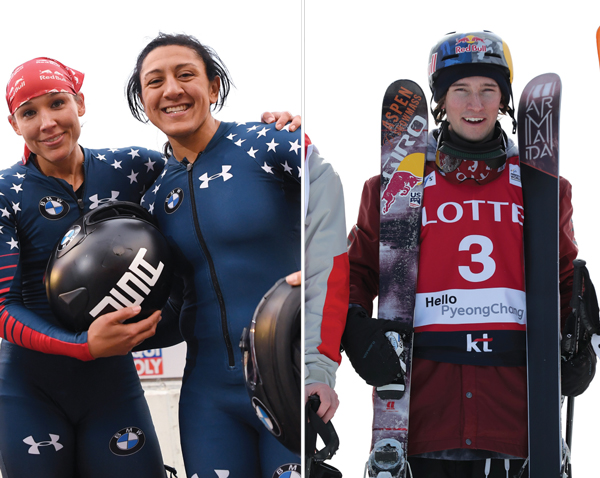Editor’s note: This story is revised from the print edition.
Olympic sports agents are worried the U.S. Olympic Committee’s loss of several prominent sponsors means their clients will have fewer deals of their own heading into the Pyeongchang Winter Games next year.
In recent months, four sponsors that each signed six or more winter athletes ahead of the 2014 Sochi Games have left the USOC portfolio: Citi (nine athletes), AT&T (eight), TD Ameritrade (seven) and BMW (six). A fifth, BP (six), had its USOC contract expire and its renewal situation is unclear.
Members of Team USA are free to sign personal deals with any company, but brands with formal rights to the Olympic rings are the most reliable sources of endorsement deals. Official sponsors have much more flexibility to use athletes during the Games than non-sponsors, and often see them as necessary extensions of a brand campaign.
 |
Agents for both Elana Meyers Taylor (at right with Lolo Jones) and Torin Yater-Wallace (right) say the loss of USOC sponsors such as Citi and AT&T will affect short-term opportunities.
Photos by: GETTY IMAGES
|
“There’s no question having lost these sponsors, there’s fewer opportunities for athletes,” said Patrick Quinn, a partner at Chicago Sports & Entertainment Partners, which represents bobsled driver Elana Meyers Taylor and others. “It’s not known at this point whether the new sponsors will make that up.”
The sponsor turnover adds to an already difficult environment, with many corporate partners still unwinding after an aggressive Rio 2016 campaign and planners sensing disinterest in the far smaller Winter Games on the opposite side of the globe.
“The deck is stacked against us as we go looking for sponsorship deals because there aren’t as many (USOC sponsors), and you’re also dealing with Asia again,” said Dan Levy, senior vice president of action and Olympic sports at Wasserman.
Some of the new sponsor class could help make up the difference.
Toyota is now a global sponsor in the mobility category, supplanting BMW, and new USOC partner Mondelez (cookies and crackers) is potentially a strong pipeline. AT&T was replaced by Comcast, which has an extra incentive to boost market awareness in the Winter Games as owner of broadcast rights holder NBCUniversal. Also, Hershey and MilkPEP have joined since Sochi, and Bridgestone and Alibaba have signed global rights deals with the IOC since then.
But those companies, still new to the Olympic world, have not made their intentions for 2018 clear.
“All it takes is for one sponsor to decide they’re going to sign 15 or 20 athletes, and that’s a game-changer, so you just don’t know,” Levy said, recalling Procter & Gamble’s robust entrance on the athlete scene after it signed with the USOC before the 2010 Vancouver Games.
While there are some newcomers, the banking, online brokerage, hotel and beer categories remain open. Recently departed Hilton and Budweiser were not important sources of athlete deals.
“Seeing Citi gone is a tough one, because they always did a lot,” said Michael Spencer, a Wasserman freeskiing agent who represents Gus Kenworthy, Torin Yater-Wallace and others. He’s bracing for a down year in general, he said, based on early conversations across the market.
From a property and partner perspective, the shrinkage of the USOC’s domestic portfolio is not altogether negative. Sponsors might find it easier to stand out, and the rising value of the deals keeps the USOC books from suffering too much. Success at the IOC’s global sponsorship tier, including Bridgestone, Toyota and Alibaba, means more money flowing into the Olympic world in general.
But for athletes, the primary question is how many total options they have.
“When some of these companies really build a team of five or six athletes or more, it really starts to spread the wealth and it really helps those athletes,” said Brant Feldman, managing partner of American Group Management, noting Citi and BP as especially strong athlete dealmakers. Like others, Feldman said he was confident USOC CMO Lisa Baird would find additional partners before Pyeongchang.
Tom Yaps, action sports managing director at Evolution Managing + Marketing, downplayed the challenge of lost Team USA sponsors.
“At a certain point it’s up to us to go get these guys deals,” Yaps said. “Is it easier if the USOC has 25 companies that are all spending in the athlete space? Yes, of course. But if there are only 20 of them, there are still lots of other companies out there.”




